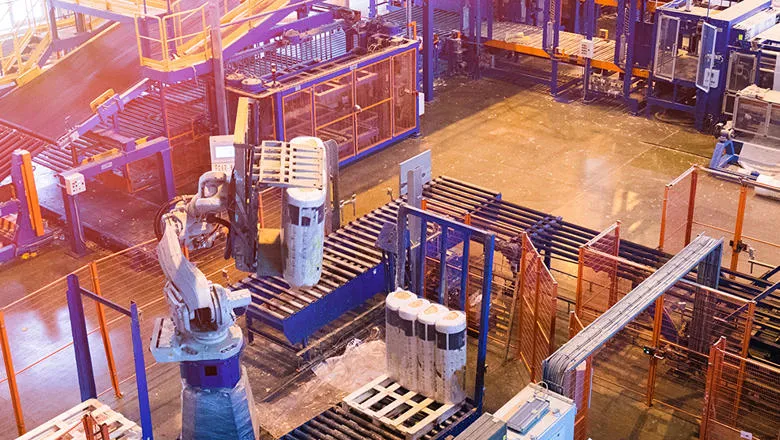16 August 2019
People not robots are the key to the fourth industrial revolution
Mark Kleinman
MARK KLEINMAN: The public remain open to new technology, but government must act to ensure negative narratives do not take hold.

Many people think that a “fourth industrial revolution” bringing artificial intelligence, robotics, nanotechnology, and others is on the horizon. They’re wrong. The fourth industrial revolution is upon us now. Whilst the robots and gizmos may grab the headlines, innovation and economic growth are about people as much as they are about technologies. Public attitudes to innovation and new technologies, including perceptions about how it impacts individuals and their families, are key to the success of this economic revolution.
Previous economic transformations have had serious and sustained negative impacts on communities. In the past, governments and policy-makers have failed to plan for and manage change to ensure that benefits are widely distributed and negative impacts adequately mitigated. Can we do better this time?
Andrew Yang, a tech entrepreneur seeking the Democratic nomination for US President in 2020, points out that there are over 3 million Americans who work as truck drivers, 94% of whom are male, with an average age of 49 and typically a high-school education or one year of college. As self-driving trucks become a reality, their jobs along with related jobs in businesses such as truck stops, diners, hotels amongst others will be at risk.
In a new paper published today by the Policy Institute at King’s College London, in collaboration with Ipsos MORI and the Centre for London, we analyse the British public’s attitudes towards the tech revolution. The evidence shows that people are relatively optimistic about the potential of innovation - much more so than in other western countries. But this openness and optimism about new technology will fade quickly if we don’t plan for some of the less popular consequences.
The impact of automation on work is an area of considerable public concern. Ipsos data reveals that 54% of the British public believe that more jobs will be lost than gained due to automation in the next 15 years, with just 11% disagreeing.
Despite this widespread concern, far fewer people think their own job is on the line. In the 2017 British Social Attitudes survey, three-quarters of the public felt that many jobs done by humans would be done by robots within the next 10 years. However just 10% worried about losing their own job to a machine. Ipsos data shows similar results, with two-thirds unconcerned about losing their jobs in the next 15 years. And the groups most at risk from automation, such as those with fewer educational qualifications, or in manual trades, showed no more concern than others.
In the absence of any broader narrative about what can be done to mitigate the risks of automation, there is support amongst the public for perhaps over-simplistic solutions. 50% of Ipsos respondents agreed with the imposition of “human quotas”, mandating companies which automate heavily to employ a minimum number of people. 44% of the public also backed an unspecified “automation tax” on these companies.
Much of the public simply don’t yet know enough about how AI or automation works, or where innovations might be used, to make an informed decision on whether they support or oppose them. This creates a vacuum of information, into which negative narratives about Britain’s future are just as likely to take root as positive ones.
For policy-makers, there are serious challenges. The impact of AI on the economy and society will be very wide and very deep. The policy response and management of change will have to encompass many different areas, including industrial policy, education and employability, and public engagement. But just as important will be developing a political narrative, ideally one which reflects a broad-based and cross-party consensus.
The government’s industrial strategy white paper, published in November 2017, painted a picture of the future with broad brush strokes - describing “grand challenges”, together with their associated themes of people and place, putting technological advance front and centre of this “whole nation” domestic agenda. Just as a strategy should do.
What approach will the new Prime Minister, Boris Johnson, and his government take to the industrial strategy? The reasons for creating the strategy in the first place still remain, and at the time of writing, the UK government’s business department is still called the “Department for Business, Energy and Industrial Strategy”. But the industrial strategy lacks a compelling narrative that speaks to stakeholders and the wider public. It’s missing a vision that sets out the benefits and opportunities for change as well as the risks and casualties, in a way that’s accessible and meaningful for individuals and their families.
The fourth industrial revolution is well and truly under way, but we are only just beginning to grapple with the huge economic, social and political impacts it will bring. The challenge for policy-makers is to move beyond the “silo” approach and change the way we think about industrial policy overall – recognising the links and feedback loops between policy areas, engaging in open and honest dialogue with the public and stakeholders, and planning for and managing this transformation to the benefit of everyone.
This piece was originally published in Public Technology.
Mark Kleinman is Professor of Public Policy and Director of Analysis at the Policy Institute, King’s College London.
